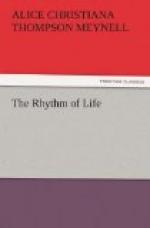COMPOSURE
Tribulation, Immortality, the Multitude: what remedy of composure do these words bring for their own great disquiet! Without the remoteness of the Latinity the thought would come too close and shake too cruelly. In order to the sane endurance of the intimate trouble of the soul an aloofness of language is needful. Johnson feared death. Did his noble English control and postpone the terror? Did it keep the fear at some courteous, deferent distance from the centre of that human heart, in the very act of the leap and lapse of mortality? Doubtless there is in language such an educative power. Speech is a school. Every language is a persuasion, an induced habit, an instrument which receives the note indeed but gives the tone. Every language imposes a quality, teaches a temper, proposes a way, bestows a tradition: this is the tone—the voice—of the instrument. Every language, by counter-change, replies to the writer’s touch or breath his own intention, articulate: this is his note. Much has always been said, many things to the purpose have been thought, of the power and the responsibility of the note. Of the legislation and influence of the tone I have been led to think by comparing the tranquillity of Johnson and the composure of Canning with the stimulated and close emotion, the interior trouble, of those writers who have entered as disciples in the school of the more Teutonic English.




